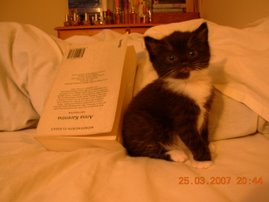A slightly unusual form of proportional representation, known as the single transferable vote (STV), is used for elections to the Dáil. There is more than one seat in a constituency and voters indicate their candidates in order of preference by putting a number next to their name on the ballot ("1" for the favourite candidate, "2" for the next favoured, etc.).
A quota is established for each constituency when the votes are counted. This quota is calculated as follows. Let V be the number of valid votes. Let S be the number of seats in the constituency.
The quota Q is V ----- + 1 S+1 If there were 60,000 votes in a three seat constituency the quota would be ((60000 / 4) + 1) = 15,001 votes.
Counts are divided into rounds. In the first round, all first preferences are counted. At the end of each round, the votes to be counted during the next round are determined as follows - if one or more candidates receive the quota of votes they are deemed elected; the surplus votes of the most popular candidate are redistributed among the remaining (unelected) candidates according to the next preference - if no candidate has reached the quota, the candidate with the least number of votes is eliminated and his votes are redistributed among the remaining candidates according to the next preference Rounds are repeated until either all the seats are filled or the number of vacant seats equals the number of remaining candidates. In the latter case, the remaining candidates are deemed elected even though they got less than the quota of votes. If a candidate exceeds the quota on the first count, the excess votes are distributed in proportion to _all_ the votes for that candidate (i.e. the second preferences on all the ballots are counted). The actual votes transferred are chosen at random (obviously making sure that they are for the appropriate candidate). On subsequent rounds, the votes are chosen at random _without_ first counting all the next preferences. Transferred votes are transferred again before first preferences. Because counting is a more complicated process than in most other countries, it takes longer. Counting is not even started until the day after the election and can go on for days if candidates demand a recount. Most political parties have experts, called tally men, who (using local knowledge and years of experience) try to predict early on in the count what the result is going to be. A good tally man can tell the outcome to within a few hundred votes after only a few ballot boxes have been counted. The first-past-the-post system is used in Northern Ireland, except for elections to local councils and the European Parliament, when a slightly different form of proportional STV is used.
What are the political parties in the Republic?
Fianna Fáil, Bertie Ahern: http://www.fiannafail.ie/
Fine Gael, Enda Kenny: http://www.finegael.com/
Labour Party, Pat Rabite http://www.labour.ie/
Progressive Democrats Micheal Mc Dowell: http://ireland.iol.ie/pd/
Green Party, Trevor Sargent: http://www.imsgrp.com/greenparty/
Sinn Féin, Gerry Adams: http://sinnfein.ie/
From: Irish FAQ - Politics









Aucun commentaire:
Enregistrer un commentaire